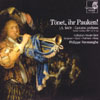Bach Tönet, ihr Pauken! - Cantatas, BWV207 & 214
Music written for a special occasion, Herreweghe makes it special indeed
View record and artist detailsRecord and Artist Details
Composer or Director: Johann Sebastian Bach
Genre:
Vocal
Label: Harmonia Mundi
Magazine Review Date: 3/2006
Media Format: CD or Download
Media Runtime: 56
Mastering:
Stereo
DDD
Catalogue Number: HMC90 1860

Tracks:
| Composition | Artist Credit |
|---|---|
| Cantata No. 207, 'Vereinigte Zweitracht der wechse |
Johann Sebastian Bach, Composer
Carolyn Sampson, Soprano Ghent Collegium Vocale Ingeborg Danz, Contralto (Female alto) Johann Sebastian Bach, Composer Mark Padmore, Tenor Peter Kooy, Bass Philippe Herreweghe, Conductor |
| Cantata No. 214, 'Tönet, ihr Pauken! Erschalle |
Johann Sebastian Bach, Composer
Carolyn Sampson, Soprano Ghent Collegium Vocale Ingeborg Danz, Contralto (Female alto) Johann Sebastian Bach, Composer Mark Padmore, Tenor Peter Kooy, Bass Philippe Herreweghe, Conductor |
Author: Jonathan Freeman-Attwood
Whether parody or prototype, Bach’s handful of secular cantatas present the face of a municipal composer who often sought to enhance his reputation by rising to special occasions. These two works are exceptional examples.
In Vereinigte Zweitracht, the subject is a popular professor named Kortte, whose inauguration in late 1726 encouraged his devoted students to commission a congratulatory work. For Tönet, ihr Pauken! from 1733 the purpose is more openly self-promotional as Bach sought, as he did in the dedication of his Mass of the same year, to ingratiate himself with the King of Poland and Elector of Saxony. This is, quite coincidentally, a brilliantly conceived homage cantata to the Elector’s wife.
As usual, allegorical figures convey prized human qualities in various degrees of panegyric and yet the sensibilities in the music are far from obsequious. In recasting the third movement of the third Brandenburg Concerto for No 207, the tone is set for something compelling and moving. Philippe Herreweghe is equal to both with a performance of elegance and due restraint. Collegium Vocale – as their name suggests – relish the lines, the textural possibilities (note the mellow, dignified oboe sound) and the rhetorical detail. Mark Padmore’s aria on ‘Diligence’ is a beautifully poetic and fluent reading and the later duet between Honour (Carolyn Sampson) and Happiness (Peter Kooy) trips with an effortless glee.
Tönet is the original source for movements which Bach was to recondition for the Christmas Oratorio. The opening movement is all but identical to the equivalent in the Oratorio but others present fascinating textual deviations which require, especially in the bass aria that was to become ‘Grosser Herr’, an adaptable ear for music so familiar.
Again, Herreweghe pitches the work just right, with consummate performances from the radiant Sampson (probably her best Bach work to date) and the soft-grained focus of contralto Ingeborg Danz. Her sincere and unsolicitous ‘Gratitude’, from No 207, with its winning obbligato flutes and mesmerising bass-line (it arches, hovers, rises and sinks), is exquisite. Kooy has rather less edge and character to his voice than in recent years but that’s a small gripe in a release of considerable aplomb and exceptional vitality.
In Vereinigte Zweitracht, the subject is a popular professor named Kortte, whose inauguration in late 1726 encouraged his devoted students to commission a congratulatory work. For Tönet, ihr Pauken! from 1733 the purpose is more openly self-promotional as Bach sought, as he did in the dedication of his Mass of the same year, to ingratiate himself with the King of Poland and Elector of Saxony. This is, quite coincidentally, a brilliantly conceived homage cantata to the Elector’s wife.
As usual, allegorical figures convey prized human qualities in various degrees of panegyric and yet the sensibilities in the music are far from obsequious. In recasting the third movement of the third Brandenburg Concerto for No 207, the tone is set for something compelling and moving. Philippe Herreweghe is equal to both with a performance of elegance and due restraint. Collegium Vocale – as their name suggests – relish the lines, the textural possibilities (note the mellow, dignified oboe sound) and the rhetorical detail. Mark Padmore’s aria on ‘Diligence’ is a beautifully poetic and fluent reading and the later duet between Honour (Carolyn Sampson) and Happiness (Peter Kooy) trips with an effortless glee.
Tönet is the original source for movements which Bach was to recondition for the Christmas Oratorio. The opening movement is all but identical to the equivalent in the Oratorio but others present fascinating textual deviations which require, especially in the bass aria that was to become ‘Grosser Herr’, an adaptable ear for music so familiar.
Again, Herreweghe pitches the work just right, with consummate performances from the radiant Sampson (probably her best Bach work to date) and the soft-grained focus of contralto Ingeborg Danz. Her sincere and unsolicitous ‘Gratitude’, from No 207, with its winning obbligato flutes and mesmerising bass-line (it arches, hovers, rises and sinks), is exquisite. Kooy has rather less edge and character to his voice than in recent years but that’s a small gripe in a release of considerable aplomb and exceptional vitality.
Discover the world's largest classical music catalogue with Presto Music.

Gramophone Digital Club
- Digital Edition
- Digital Archive
- Reviews Database
- Full website access
From £8.75 / month
Subscribe
Gramophone Full Club
- Print Edition
- Digital Edition
- Digital Archive
- Reviews Database
- Full website access
From £11.00 / month
Subscribe
If you are a library, university or other organisation that would be interested in an institutional subscription to Gramophone please click here for further information.




